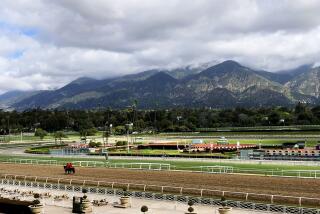Decision on Dyer’s Future May Be Told Today
- Share via
An announcement on whether the RTD’s controversial general manager, John Dyer, will keep his job could be made as early as today after a lengthy closed-door meeting of the transit district board where Dyer’s performance was evaluated Thursday.
Emerging from the session, RTD Board President Jan Hall, acting as spokeswoman for the board, said that no action was taken.
She added: “The board is trying to step forward in a responsible manner; we have an obligation to respond to concerns of the public.”
Dyer later said he was pleased with the evaluation. But, in contrast to previous pledges to stay at the helm of the RTD, he declined to discuss his future plans.
Hall and other RTD board members indicated that a press conference might be scheduled today on the subject. None would discuss what would be announced.
The development came as some possibly beneficial news emerged for the embattled transit chief: a new independent study concluding that the Southern California Rapid Transit District is correcting a number of its highly publicized problems.
The carefully worded but generally positive report by a nationally known management consulting firm comes at a crucial time for Dyer, who has been fighting to hold on to his $119,000-a-year job. Criticized for lax management by some elected officials, Dyer has become a lightning rod for complaints about Los Angeles’ transit problems.
With Gov. George Deukmejian’s veto last week of legislation to abolish the RTD--and prohibit Dyer from heading a replacement superagency--RTD board members have said they will review Dyer’s performance soon and decide on his future.
Overall, the new study concludes that in a six-month study period ending in August, “RTD management demonstrated the ability to realize performance improvements through planned action. . . . A broad array of performance areas have improved and most of those improvements should continue to yield benefits in the future.”
The report was prepared for the Los Angeles County Transportation Commission, which controls RTD funds and is often critical of the district, by the San Francisco-based consulting firm of Price Waterhouse.
In response to a request from the RTD board earlier this year, the commission agreed to hire its own outside consultants to assess the results of a six-month fix-it plan drafted by Dyer early this year amid disclosures of management problems and demands by some elected officials that Dyer resign.
Dyer and Hall said through a spokesman that they had not yet seen the report and could not comment on it.
But Dyer’s harshest critics are not likely to be swayed by the new report. Assemblyman Richard Katz (D-Sepulveda), co-author of the now-dead bill to abolish the RTD, said the report was too narrowly focused.
“I still think (Dyer’s) lack of management is a major cause of problems at the RTD,” Katz said. “What I’d like to see is a top-to-bottom management audit.”
The study measured progress toward a variety of goals set by Dyer, such as reducing bus accidents, employee drug abuse and rider complaints and curbing the rise in operating costs. It does not compare the RTD’s performance with other transit agencies.
Price Waterhouse found that improvements have been made in most of 26 problem areas identified by Dyer. However, in 12 of them, the progress was short of the goals set by the RTD.
The report cautions that it dealt only with items identified in Dyer’s plan.
“This plan should not be construed to comprise all of the critical success factors related to RTD operations,” the report says.
Sharon Neely, a commission manager who oversaw preparation of the report, also noted that while the RTD exceeded Dyer’s target for reducing costly employee absenteeism, it has not yet met a tougher goal set last year by the commission. Failing to meet the commission’s goal could mean a penalty of $12 million in RTD operating funds.
The net savings attributed to improvements were nearly $1 million more than expected, Price Waterhouse estimated. Its figures showed that it cost the district less than $1 million to implement a plan that wound up saving the system about $2 million.
Some of the highlights of the report are:
- Of employees tested for drug use, those testing positive decreased from 7.4% to 5.5%. The goal was 6.3%
- The number of active bus drivers and mechanics without valid licenses and medical certificates dropped from 11 per month to 0.
- The bus accident rate declined from 4.56 per 100,000 miles to 4.45, shy of the goal of 4.4. The percentage of accidents chargeable to the RTD increased slightly.
- Absenteeism dropped from 15.25 days per six months for every active-duty driver to 14.33 days, while the goal was 14.49 days.
- Operating costs decreased from $68.24 per hour of bus service to $67.53. Price Waterhouse calculated that Dyer’s “improvement” goal would have permitted costs to actually increase to $69.89 per bus hour.
More to Read
Sign up for Essential California
The most important California stories and recommendations in your inbox every morning.
You may occasionally receive promotional content from the Los Angeles Times.













